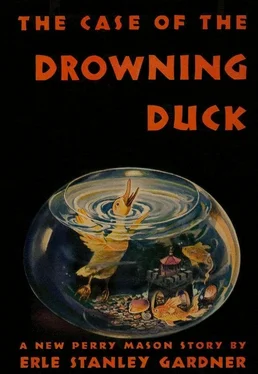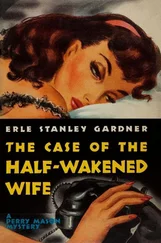“Go ahead,” Mason said.
She said, “I’ll be absolutely frank with you, Mr. Mason. I think perhaps there was a little jealousy on my part — of Sarah Adams. She could afford to let her hands get rough and harsh. When we’d go to a nightclub on a foursome, she’d look out of place. She looked just like what she was, a housewife who had spent the afternoon with her child and then, at the last minute, fixed herself up and put on her best bib and tucker to go out. She didn’t look like — like a part of the scheme of things, like a part of the night life, like she was really fitting the clothes she was wearing. But she was holding Horace Adams’ love. You could see that.”
“Despite his comments on how nice you looked?” Mason asked.
“Oh, that!” and she snapped her fingers. “He saw me just as he saw every other woman, as so much scenery. He’d appreciate a good-looking woman just as he’d appreciate a good-looking painting or something; but his eyes were always coming back to his wife. He’d keep looking at her with that expression of being settled and comfortable and secure and happy.”
“And your husband didn’t look at you that way?” Mason asked.
“No.”
“Why not?”
“He was built differently. He — I’m not kidding myself a bit, Mr. Mason. My husband would have stepped out on me if someone had come along who was physically more attractive than I was. I made it my business to see that I led the procession, that’s all.”
“I see.”
“I’m not certain that you do. You’d have to know how a woman feels about those things in order to understand. It was an effort, and somewhere in the background was a fear, a fear that my foot might slip and I wouldn’t head the procession any more.”
“So when you thought your husband had gone to Reno, you...”
“I was scared stiff,” she admitted, “and then when I didn’t hear from him, I became frantic. I happened to have a friend in Reno. I wired that friend to check over all the hotels and find out where David was staying and find out — well, find out if he was alone.”
“And then what?” Mason asked.
“When I found David wasn’t registered in any hotel in Reno, I went up to have a showdown with Horace; and then Horace acted so evasive and so completely uncomfortable that I knew he was lying or trying to cover something up; and then he told me that David had run away with another girl.”
“Who?” Mason asked.
“I don’t think her name needs to enter into it.”
“Why?”
“Because, of course, David hadn’t run away with her. He hadn’t had anything to do with her. It was just something Horace had made up to try and cover up the murder.”
“Where is this woman now?” Mason asked.
“Good heavens, I don’t know. I’ve entirely lost track of her. I don’t think I ever even knew her. She was just a name to me. I would, of course, have found out more about her if it hadn’t been for the way Horace acted. I called in the police, and it wasn’t long before the police found out that he was lying and that David had been murdered. I don’t know. I suppose that if Horace had told the truth, he could have escaped the death penalty.”
“What was the truth?”
“They must have had some terrible quarrel over something there in the plant, and Horace struck my husband down in a fit of anger. Then he was panic-stricken and knew he had to do something with the body. In place of calling in the police and confessing, he waited until night, broke a hole in the cement, dug a grave, buried David, covered the place over with cement, put a lot of rubbish and shavings over the new cement until it could harden, and, of course, had me thinking all the time that David had gone to Reno very unexpectedly on business.”
“How long before you began to get suspicious?” Mason asked.
“It must have been three or four days. I guess it must have been five days before Horace told this story about David having run away with the woman... after my friend reported David wasn’t in Reno.”
Mason leaned back in his swivel chair and closed his eyes as though trying to reconstruct something from the past. “Go right ahead. Keep on talking, Mrs. Dangerfield.”
“It’s a terrible thing to be in love with somebody and have that person killed. It comes first as a numbing shock, and then — well, I had an overpowering, terrific hatred for Horace Adams, for his wife, and I guess if I’d thought of it, even for the little boy. There wasn’t a particle of sympathy or charity in my make-up. When the jury brought in a verdict against Horace that meant he would hang, I was wild with joy. I went out and celebrated all by myself.”
“You didn’t feel any sympathy for Mrs. Adams?” he asked, still keeping his eyes closed.
“None whatever. I tell you, I hated her. I didn’t feel any sympathy for anyone. I could have pulled the rope that hung Horace Adams, and been glad to do it. I tried to get them to let me be present at the execution, but they wouldn’t.”
“Why did you want to?”
“I just wanted to scream, ‘You murderer!’ at him when the trap opened, so that he could have my words ringing in his ears as his neck broke. I–I tell you I was savage. I’m rather an emotional animal, Mr. Mason.”
The lawyer opened his eyes, looked at her, and said, “Yes, I can appreciate that.”
“I’m telling you all this so you’ll understand my present position.”
“What is your present position?” Mason asked.
“I realize something of how terribly wrong I was.”
“You’re sorry?”
“Not for the way I felt toward Horace,” she said hastily. “I could have killed him with my bare hands. I’m glad that his lawyer bungled his defense all up so that they hung him. As I say, if he’d told the truth, he’d probably have gotten off with manslaughter or second-degree murder, but the way he tried to cover up and everything — well, we won’t talk about that, because I want to talk about Sarah.”
“What about Sarah?”
“I suppose that I persecuted Sarah. I tried to keep her from getting her share of the money out of the business. I was nasty in every’ way I could be. Sarah took what cash she could get, and disappeared. It was, of course, the only thing for her to do, on account of the boy. She didn’t have much money, just a little. I never knew where she went. No one did. She covered her tracks pretty carefully. The boy was too young to remember, and she felt that she could bring him up so he would never know his father was executed for murder.”
“Do you know where she went?” Mason asked.
She laughed at him and said, “Don’t be so cagey, Mr. Mason. Of course, I do, now. She went to California. She worked and worked hard — too hard. She gave the boy a pretty good education. He always thought his father had been killed in an automobile accident, that they didn’t have any other relatives. She carefully kept him from knowing anything at all about his past life or having any contacts which would reveal it to him. It was a splendid thing. She sacrificed her entire life for that.
“Well, she worked too hard. She got run down and got tuberculosis. Four or five years ago she went to the Red River Valley. She was well thought of there. She kept on working even when she should have been resting. If she’d gone to a hospital and had absolute quiet, she might have cured herself, but she was putting her boy through school, so she worked until — until she couldn’t work any more.”
“And then?” Mason asked.
“Then she died.”
“How do you know all this?” Mason asked.
“Because I made it my business to find out.”
“Why?”
“Because — believe it or not, I developed a conscience.”
Читать дальше












